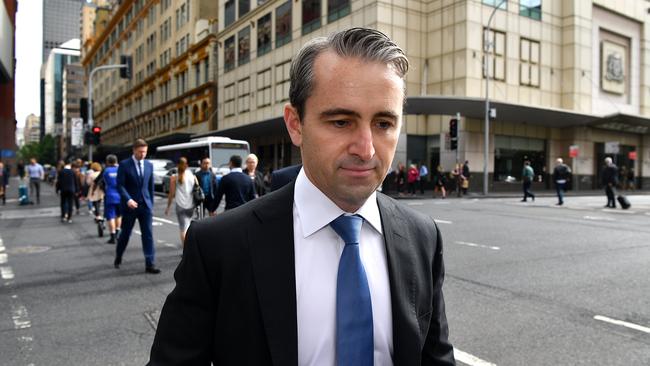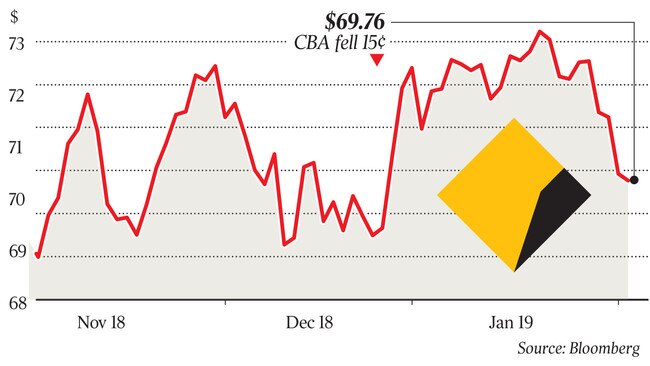Matt Comyn is first bank chief to face investors in post-Hayne world
Commonwealth Bank CEO Matt Comyn will be the first bank boss to face an investor grilling after release of the Hayne report.

Commonwealth Bank chief executive Matt Comyn — tipped to deliver a $4.9 billion interim cash profit — will be the first major bank boss to face an investor grilling after the release of the landmark Hayne royal commission report.
Investors and analysts will be keen to hear his response to any recommendations for legal action against CBA and any proposed changes to responsible lending obligations, mortgage broker commissions or bank pay models on Wednesday, when the bank reports its first-half profits.
Mr Comyn’s view on a slowdown in the housing market, souring loans and the potential for capital management will also be top of mind.
The median estimate of five analysts polled by The Australian puts CBA’s reported cash profit at $4.9bn for the six months ended December 31, compared with $4.87bn for the same period a year earlier.
Continuing cash profit, which takes into account the divestments of CBA’s life insurance division and global asset management arm, is tipped to print slightly lower in the first half than the headline cash profit number. Last year’s interim profit from continuing operations, including a provision for the Austrac penalty, was $4.74bn.
CBA’s results come less than two days after the release of Kenneth Hayne’s final report into misconduct in the financial services sector, which could upend the status quo in banking across several areas.
“The [CBA] result is likely to be messy, given a large number of restatements (discontinued businesses, divisional restructures) and contain a number of large lumpy items,” UBS analyst Jonathan Mott said. “That said, the underlying result is expected to be solid following a strong first quarter 2019 trading update.”
UBS, which expects CBA to deliver a flat interim dividend of $2, also said any large-scale cost-cutting program being planned by the bank was probably “a medium-term” prospect, given the results were expected just 36 hours after the royal commission’s findings.
The bank’s shares have declined almost 13 per cent in the past year and closed at $69.76 on Friday.
That follows CBA’s roasting at the royal commission for charging fees to dead customers and for dragging its heels on moving 15,000 super members to low-fee accounts after January 1, 2014, a breach of the law.
Citigroup analyst Brendan Sproules expected CBA’s operating trends to be “slightly ahead of peers” in the first half.
He also highlighted the potential for a return of capital to shareholders following the bank’s divestments.
“With divestments continuing, the prospect of capital returns via buyback/special dividend and a larger restructuring program could be the driver of outperformance,” he said.
“CBA’s overweight retail banking mix means these initiatives are required to offset retail banking headwinds.”
CBA told the ASX this month it expected non-cash losses of $169m to affect statutory interim profit, as it booked losses on divestments and other expenses.

The statement also included a restructuring of several of the divisions, including shifting Perth-based Bankwest into CBA’s retail bank.
Morgan Stanley analyst Richard Wiles expected CBA’s interim revenue to be broadly flat on a year earlier and its net interest margin steady on the prior six months at 2.12 per cent.
“We think investors are expecting resilient revenue trends, given about 2 per cent half-on-half Australian housing loan growth, second quarter 2019 backbook repricing and good deposit performance,” he said.
“Key downside risks include lower trading income, softer non-housing loan growth and higher wholesale funding costs.”
Mr Wiles reckoned CBA’s interim result was too early for the bank to announce a buyback, but he expected a $3.5bn buyback of stock in 2020. He also expected the sale of CBA’s life insurance and global asset management unit would create an “earnings hole” of about 5 per cent and could put a dividend cut on the agenda.
CBA is also seeking to separate its financial planning and mortgage broking interests, including Aussie Home Loans, into a new entity on the ASX.




To join the conversation, please log in. Don't have an account? Register
Join the conversation, you are commenting as Logout